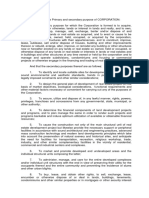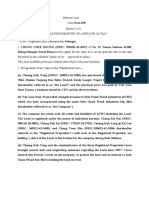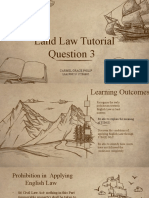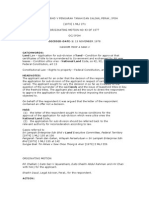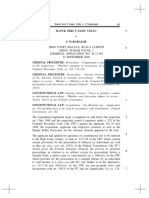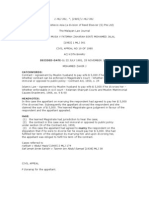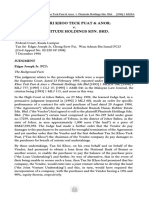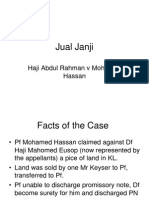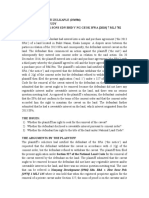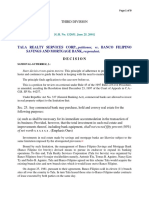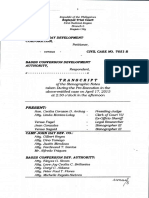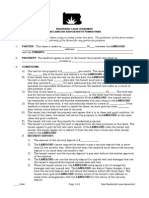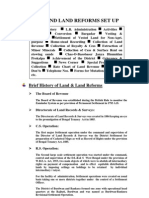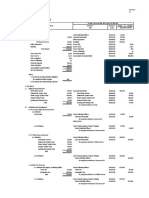FATIMAH V MOIDEEN KUTTY - (1969) 1 MLJ 72
FATIMAH V MOIDEEN KUTTY - (1969) 1 MLJ 72
Uploaded by
polarfirefliesCopyright:
Available Formats
FATIMAH V MOIDEEN KUTTY - (1969) 1 MLJ 72
FATIMAH V MOIDEEN KUTTY - (1969) 1 MLJ 72
Uploaded by
polarfirefliesOriginal Title
Copyright
Available Formats
Share this document
Did you find this document useful?
Is this content inappropriate?
Copyright:
Available Formats
FATIMAH V MOIDEEN KUTTY - (1969) 1 MLJ 72
FATIMAH V MOIDEEN KUTTY - (1969) 1 MLJ 72
Uploaded by
polarfirefliesCopyright:
Available Formats
Page 1
Malayan Law Journal Reports/1969/Volume 1/FATIMAH v MOIDEEN KUTTY - [1969] 1 MLJ 72 - 9 December 1968 3 pages [1969] 1 MLJ 72
FATIMAH v MOIDEEN KUTTY
FEDERAL COURT JOHORE BAHRU AZMI LP, SUFFIAN & MACINTYRE FJJ CIVIL APPEAL NO X65 OF 1967 9 December 1968 Land Laws -- Land held on temporary occupation licence -- Death of licensee -- Claim for rent by administratrix -- Whether occupier entitled to say that neither the deceased nor the administratrix had title to land at material time -- Evidence Ordinance, 1950, s 116 In this case the respondent occupied the land which was originally held by the husband of the appellant on a temporary occupation licence. The husband of the appellant died in 1962 and when the Collector of the Land Revenue heard of the death he refused to renew the licence after the end of 1963. The appellant as administratrix claimed rent in respect of the period July 1, 1964 to February 28, 1965. It was held in the magistrate's court and on appeal to the High Court ( [1968] 1 MLJ 3) that she was not entitled to the rent. She appealed. Held, dismissing the appeal: (1) whatever may have been the deceased's or the widow's right between the deceased's death and the end of 1963, thereafter as the government had refused to renew the temporary occupation licence neither his estate nor the administratrix had any right of any kind whatever to the land; section 116 of the Evidence Ordinance did not prevent the tenant from contending that neither the deceased nor the widow had any title to the land in respect of the material period, because he was not saying that the deceased or the widow had no title at the beginning of the tenancy. All he did was to contend that the deceased's title had come to an end.
(2)
Cases referred to Papoo v Veeriah [1966] 1 MLJ 127 Kumar Krishna Prosad Lal Singha Deo v Baraboni Coal Concern Ltd & Ors AIR 1937 PC 251 Rev Luckman Chaplain v Pearey Lal AIR 1939 All 670 Ban Seng v Yap Pek Soo [1967] 2 MLJ 156 Tay Cheo v Chow Ngia [1967] 1 MLJ 281 Govindaraju v Krishnan [1962] MLJ 334 Bhavan Lalu v Umar Mohamed Bhaiji AIR 1927 Bombay 129 Hee Cheng v Krishnan [1955] MLJ 103
Page 2
FEDERAL COURT
DA Devadason for the appellant. Tara Singh Sidhu for the respondent. SUFFIAN FJ I have had the advantage of reading my brother MacIntyre's judgment and I too think this appeal should be dismissed. The widow (appellant) obtained a warrant of distress in respect of rent alleged to be due for the period beginning on 1st July, 1964, and ending on 28th February, 1965. On the tenant (respondent) objecting, the learned magistrate held that she was not entitled to the rent and on appeal Ali J. agreed with the learned magistrate. With respect I also agree. Immediately before the issue of the temporary occupation licence to the deceased, the land concerned was State land. After the issue of the temporary occupation licence, the land was still State land, but the deceased had a licence to occupy it temporarily. By law this licence was not transferable and I agree with Good J. in Papoo v Veeriah [1966] 1 MLJ 127 that the licence was not transmitted to the widow on the licensee's death and he died on 10th August, 1962. Thereafter the collector renewed the licence for the year 1963 in the deceased's name. When he knew of the deceased's death, he refused to renew it after the end of 1963. Whatever may have been the deceased's or the widow's right between the deceased's death and the end of 1963, thereafter because Government refused to renew the temporary occupation licence in the name of the deceased or any one else, neither his estate nor she had any right of any kind whatever to the land. Section 116 of the Evidence Ordinance, 1950 does not prevent the tenant from contending that the deceased or the widow had no title in respect of the material period beginning on 1st July, 1964, and ending on 28th February, 1965, because he was not saying that the deceased or the widow had no title at the beginning of the tenancy. All he said was that neither the deceased nor the widow had any title thereafter. Sir George Rankin when giving the advice of the Privy Council in Kumar Krishna Prosad Lal Singha Deo v Baraboni Coal Concern Ltd & Ors AIR 1937 PC 251 said at page 255 that section 116 of the Indian Evidence Act (which is identical with our section 116) does not "prevent a tenant from pleading that the title of the original lessor has since come to an end". And that was exactly what happened here. The tenant contended that the deceased's title had come to an end. The facts in the instant case are almost similar to the facts in Rev Luckman Chaplain v Pearey Lal AIR 1939 All 670. There a landlord sued for arrears of rent in respect of a period of four months - February to May, 1938 - for a bungalow let to the defendant. The bungalow being within a cantonment area was held on a tenure called the cantonment tenure under which the Government was authorized to resume possession of the land and also of any house 1969 1 MLJ 72 at 73 standing on it by offering proper compensation to the owner. The defendant resisted the suit on the ground that the title of the plaintiff had passed to the Government on 1st February, 1938, and hence the plaintiff had no right to any rent for the material period. The defendant also said that he had actually paid the rent for that period to the Government. On the authority of the above-cited Privy Council case, Mulla J. held that the defendant was not precluded by section 116 of the Indian Evidence Act from making the plea which rested upon facts which happened subsequent to the commencement of the tenancy. There was some ambiguity as to the capacity in which the widow brought these proceedings. The title of the proceedings merely described her by name. In her affidavit in support of her application for distress, however, she described herself as administratrix of her husband's estate. Be that as it may, Mr. Sault who appeared for the tenant in the lower court conceded that the widow was acting in her capacity as administratrix, and the matter was disposed of on that basis. But as her husband's temporary occupation licence died with him, the temporary occupation licence land never formed part of his estate, and so as
Page 3
administratrix she has no standing as regards this land. It is true, however, that the collector renewed the licence for the year 1963. But as administratrix the widow could have no say over the land - because letters of administration were not granted to her until 7th June, 1964, and by then the collector, on learning of the death of the deceased, had refused to renew the licence. I now say a word about attornment. In the proceedings before the learned magistrate the widow claimed that after her husband's death the tenant had continued to pay rent in respect of the premises to her and the learned magistrate found as a fact that there had been an attornment by the tenant acknowledging the widow as his landlord. If this was so, it must have been an attornment as regards the widow in her personal capacity, not in her capacity as administratrix, because though her grant of letters of administration related back to her husband's death the temporary occupation licence land had ceased to form part of his property on his death. She, however, acted in the instant case in her capacity as adminstratrix and if she wishes to take advantage of the attornment to her in her personal capacity she cannot do so in these proceedings. Azmi L.P. concurred. MACINTYRE FJ The appellant herein is the widow of one P. Kunjahamad bin Mammu who died intestate on August 10, 1962. He was the owner of 2 shop houses on a piece of land held by him under a temporary occupation licence situate within the Local Council area of Senggarang, Batu Pahat. The houses were rented to the respondent (hereinafter referred to as the tenant) at a rental of $40 per mensem. After the death of the deceased, the tenant paid the rent to the appellant (hereinafter referred to as the administratrix) at the agreed rate until July, 1964, when he commenced to remit a sum of $20 to part account of rent, and to appropriate the balance towards alleged expenses incurred in connection with the tenancy, amounting to $2,450.35. The administratrix, however, denied liability and demanded payment in full and, having failed to obtain satisfaction, refused, after the 13th of March, 1965, to accept further payments of $20 to account of rent. The alleged expenditure incurred by the tenant included the cost of repairs to the shop houses following a notice from the Local Council to demolish them as being unfit for human occupation. He was later convicted and fined $30 by the magistrate at Batu Pahat for carrying out the aforesaid repairs without obtaining the permission of the Local Council The question of whether the amount expended on repairs is reasonable or not is not relevant for the purpose of this appeal, but, for the purpose of record, it must be mentioned that a sum of $25 out of the total expenditure was paid by the tenant towards temporary occupation licence fee for the year 1963. The licence was apparently renewed for the year 1963 in the name of the deceased. In 1964, the Collector of Land Revenue, on learning of the death of the deceased, refused to renew the licence. On June 7, 1964, letters of administration to the estate of her late husband were granted to the administratrix by the High Court at Muar. The list of assets annexed to the petition included the two shop houses in question valued at $5,000. The grant was extracted on the 21st of February, 1965, and by an affidavit sworn on March 14, 1965, the administratrix applied to the magistrate at Batu Pahat for the issue of a warrant of distress to distrain the movable property of the tenant to recover arrears of rent amounting to $320 at the rate of $40 per mensem for the period commencing on July 1, 1964 and ending on February 28, 1965. A warrant was issued on March 21, and on the 24th the bailiff, accompanied by the administratrix, went to execute the warrant. What transpired at the tenant's shop appears in the report of the bailiff of the same date. He says and I quote:"I waited in the shop till 12.45 p.m. but the respondent did not turn up. I was told that two or three telephone calls to Batu Pahat were put but he could not be contacted. I then made an inventory of the goods in both the shops and was about to close the shop and affix the inventory and notice on the premises when the respondent turned up. It was about 1.00 p.m.... The respondent said that he would pay the sum on the warrant of distress under protest as he wants to contest the suit. He then paid me $342 ($320 the amount 1969 1 MLJ 72 at 74 of claim, $12 stamp fees and $10 watchmen wages). I accepted the amount and informed the applicant of the position .... I then returned to Batu Pahat and deposited the amount in court. Warrant of distress not executed."
Page 4
On May 29, 1965, the tenant lodged an objection against the wrongful seizure of the goods under the warrant of distress and gave notice to the administratrix to request the bailiff to release the money to him within 3 days from date thereof, failing which, to quote the notice, "you will be deemed to contest this objection and may be held liable in damages." In so far as the acceptance of the tender of $342 is concerned, the bailiff acted undoubtedly with the best of intentions but certainly in breach of the provisions of the Distress Ordinance. He had no authority under the Distress Ordinance to release goods he had seized and there can be no doubt he had effected a seizure despite his report to the contrary, as it would have been illegal for him to have taken an inventory under section 9(1) of the Distress Ordinance before seizure. According to the report, the inventory had been taken before the tender and acceptance of the rent money. Further proof of seizure is evidenced by the employment of a watchman for which the bailiff claimed and was paid $10 as wages. The power to release goods seized under a warrant of distress is conferred exclusively upon the judge, be he a judge of the High Court or a president of the sessions court or a magistrate, as the case may be, by the provisions of sections 16 and 17 of the Ordinance. They read as follows:"16. The tenant may apply to a judge to discharge or suspend the execution of the warrant, or to release any part of the property seized. 17. The judge may, on any such application, deal with the matter summarily and dismiss the application or discharge the warrant, or order the release unconditionally or on such terms as he thinks fit of any property seized, or may direct an issue to be tried, and, pending the determination of such issue, suspend the execution of the warrant, or may order the property to be sold and the proceeds of sale to be lodged in court, or may make such other order on such terms as he considers fair as between the parties pending the final determination of the matter."
Section 17 makes it clear that before any property seized under a warrant of distress is released, an application must be made to a judge to discharge or suspend the execution of the warrant or to release any part of the property seized whereupon the judge is empowered to make any of the orders mentioned in the section. No such application was made in this case. The tenant, who was represented by counsel, should have applied to the magistrate for an order to discharge the warrant of distress and refund the money in court, in which event the magistrate may have ordered an issue to be tried. Instead of making such an application, the tenant filed an objection in Form 34 provided under the Subordinate Courts Rules when giving notice to an execution creditor to request the bailiff to release property attached in execution of a decree but amended to read that the administratrix should request the bailiff to release the sum of $342 paid to him. Even assuming that the administratrix was disposed to direct the bailiff to refund the money, it seems to have occurred to no one that the bailiff had no authority to make an order of payment out of money in court. In my opinion, in releasing on his own initiative the goods seized, the bailiff had acted in excess of his powers under the Distress Ordinance; and that the tenant in applying for the refund of the money should have applied for a discharge of the warrant of distress on the ground that the distress was illegal, irregular or excessive. On the ground of these irregularities alone, the learned magistrate should have peremptorily struck out the proceedings and ordered the refund of the money to the tenant. He, however, preferred to hear the objection on its merits and made an order setting aside the application for distress without making an order discharging the warrant. The proper order should have been to discharge the warrant of distress. From that decision, the administratrix appealed to the High Court but the appeal was dismissed. She now appeals to this court. The issue tried by the magistrate was whether the administratrix is entitled to maintain a claim for arrears of rent in respect of houses built on State land then under illegal occupation since the temporary occupation licence issued to the deceased landlord had lapsed following his death in 1962. It was orally pleaded, on behalf of the administratrix, that the tenant having accepted the administratrix as his landlord by attornment as evidenced by his letter dated February 10, 1965, was estopped from questioning her title by virtue of the provisions of section 116 of the Evidence Ordinance, 1950 which read as follows:"116. No tenant of immovable property, or person claiming through such tenant, shall during the continuance of the tenancy be permitted to deny that the landlord of such tenant had at the beginning of the tenancy a title to such
Page 5
immovable property; and no person who came upon any immovable property by the licence of the person in possession thereof shall be permitted to deny that such person had a title to such possession at the time when such licence was given."
There can be no doubt that the distress proceedings in this case were brought by the appellant as administratrix of the estate of her late husband. This fact is clear not only from her statement in the affidavit in support of the application for distress but also from her evidence under cross-examination. However, it is equally clear that the shop houses which were the subject matter of the tenancy are now under illegal occupation by the tenant. In Papoo v Veeriah [1966] 1 MLJ 127, Good J. held that neither the land 1969 1 MLJ 72 at 75 the subject matter of the temporary occupation licence nor anything which is attached to the land can be transferred or pass on intestacy. This is a judgment with which I respectfully agree. The law being such, it must be assumed that every contract of tenancy in respect of a house on State land contains an implied term that the tenancy is valid only for the duration of the landlord's licence to occupy the land. On the expiration of the landlord's licence either by effluxion of time or by the death of the licensee, the contract of tenancy must be deemed to have come to an end and the relationship of landlord and tenant extinguished. Therefore, once a tenancy ceases to exist the question of estoppel under section 116 of the Evidence Ordinance will not arise. It must also follow, in the circumstances of this case, that the legal representative of the estate of the deceased landlord cannot exercise the right to distrain under the Distress Ordinance since the relationship of landlord and tenancy has ceased to exist with the death of the licensee. In the course of hearing, counsel for the administratrix confused the real issue by raising the question of attornment. The learned magistrate held that the tenant had accepted the appellant as landlord by attornment but that her act in permitting State land to be occupied was contrary to law. With respect, I do not think that the question of the legality of the contract or the application of law of estoppel arises in this case. If, however, the right to distrain for rent is based on the appellant's claim to be landlord by attornment, then she should have applied for the warrant of distress on her own right as landlord and not as administratrix of the estate of the deceased. It appears to me, therefore, that these proceedings are misconceived. I would dismiss the appeal with costs. Appeal dismissed. Solicitors: DA Devadason; Sault, Keith Seller & Co
You might also like
- Sample Primary and Secondary Purpose of CORPORATIONDocument2 pagesSample Primary and Secondary Purpose of CORPORATIONJmv DeGuzman-Lugtu95% (19)
- Tenancy Contract Registration FormDocument2 pagesTenancy Contract Registration FormKevin Martin67% (6)
- Accounting at MacCloud and Financial ReportingDocument3 pagesAccounting at MacCloud and Financial Reporting0p00No ratings yet
- How To Create Multiple Streams of Income BookDocument288 pagesHow To Create Multiple Streams of Income BookDarryl47100% (4)
- Zaidi Kanapiah Case ReviewDocument8 pagesZaidi Kanapiah Case ReviewGROWNo ratings yet
- Form 19BDocument3 pagesForm 19Bnoor athirah100% (1)
- S206 (3) National Land CodeDocument25 pagesS206 (3) National Land CodeCarmel Grace PhilipNo ratings yet
- Fusion ReceptionDocument2 pagesFusion ReceptionAfidatul AzwaNo ratings yet
- Cara Jawab LawDocument5 pagesCara Jawab LawM Amirul AzlanNo ratings yet
- Ipoh Garden V PTG PerakDocument6 pagesIpoh Garden V PTG PerakRubbyRdNo ratings yet
- Lecture 9 Hire Purchase LawDocument31 pagesLecture 9 Hire Purchase LawSyarah Syazwan SaturyNo ratings yet
- Alberta Residential Offer To LeaseDocument2 pagesAlberta Residential Offer To LeaseAlberta Real Estate67% (3)
- Abdul Rahman Talib V Seenivasagam & Anor - (Document19 pagesAbdul Rahman Talib V Seenivasagam & Anor - (ahmad fawwaz100% (2)
- Chapter 19 Rescission 6 Dec 2013 Now For LectureDocument31 pagesChapter 19 Rescission 6 Dec 2013 Now For LectureHui Yin ChinNo ratings yet
- Article 5 - Sem Ii 2013-14Document125 pagesArticle 5 - Sem Ii 2013-14Luqman Hakeem100% (1)
- Q&A PartnershipDocument24 pagesQ&A PartnershipLoveLyzaNo ratings yet
- Chai Yon Ken & Anor v. Kamarul Jaman Mydin & AnorDocument28 pagesChai Yon Ken & Anor v. Kamarul Jaman Mydin & AnorhdccfhjfxkNo ratings yet
- Documentary Evidence (Part 2)Document16 pagesDocumentary Evidence (Part 2)LEANDRA ABIGAIL DE COSTANo ratings yet
- Contract Ii Case Review (Implied Terms) PDFDocument53 pagesContract Ii Case Review (Implied Terms) PDFkhairiah tsamNo ratings yet
- Samivelu V NadarajahDocument25 pagesSamivelu V NadarajahAmira NadhirahNo ratings yet
- Segar Oil Palm Estate SDN BHD V Tay Tho BokDocument11 pagesSegar Oil Palm Estate SDN BHD V Tay Tho BokChin Kuen YeiNo ratings yet
- Ismail Bin Mohamad V Wan Khairani BT Wan Mahmood and Another AppealDocument9 pagesIsmail Bin Mohamad V Wan Khairani BT Wan Mahmood and Another AppealSofiah OmarNo ratings yet
- Recent CasesDocument3 pagesRecent CasesNur SyazwinaNo ratings yet
- Applicability of English Equitability Principles in Malaysian Torrens SystemDocument4 pagesApplicability of English Equitability Principles in Malaysian Torrens SystemJunneKhoo100% (1)
- EPS 2018 QB 2 (WA-18-168-01-2018) NEOH SIEW WEN (01653147xA335E)Document4 pagesEPS 2018 QB 2 (WA-18-168-01-2018) NEOH SIEW WEN (01653147xA335E)Muhammad Nur ImanNo ratings yet
- Case: Jumatsah V Voon Kin KuetDocument8 pagesCase: Jumatsah V Voon Kin KuetAdlyZulfadhlyZulkeflyNo ratings yet
- Legal Developments 2015Document13 pagesLegal Developments 2015hasnansuaimiNo ratings yet
- W6 IllegalityDocument82 pagesW6 IllegalityNu'man AzhamNo ratings yet
- Article 152 and 153 of The Federal ConstitutionDocument13 pagesArticle 152 and 153 of The Federal ConstitutionhaqimNo ratings yet
- HamzahDocument5 pagesHamzahfarahayn100% (2)
- Tan Sri Khoo Teck Puat V Plenitude Holdings SDN BHDDocument19 pagesTan Sri Khoo Teck Puat V Plenitude Holdings SDN BHDAisyah RazakNo ratings yet
- Ahmad Bin Omar V Haji Salleh Bin Sheik OsmanDocument5 pagesAhmad Bin Omar V Haji Salleh Bin Sheik OsmanNuraniNo ratings yet
- Haji Abdul Rahman V Mohamad HassanDocument9 pagesHaji Abdul Rahman V Mohamad HassanYin ChienNo ratings yet
- Tort Law TRESPASS TO LANDDocument42 pagesTort Law TRESPASS TO LANDJessica LimNo ratings yet
- Aishah Binti Mohd Saman & 3 Ors. v. Kalsom BT Haji Mohamad Nor (2000) 1 AMR 607Document6 pagesAishah Binti Mohd Saman & 3 Ors. v. Kalsom BT Haji Mohamad Nor (2000) 1 AMR 607Hweh Tze GohNo ratings yet
- WotherspoonDocument5 pagesWotherspoonPyah Manje100% (1)
- Local Limits of JurisdictionDocument2 pagesLocal Limits of JurisdictionTeebaSolaimalaiNo ratings yet
- Land Law Case StudyDocument4 pagesLand Law Case StudyMorgan Phrasaddha Naidu PuspakaranNo ratings yet
- DIL 1103 Contract Law - Notes On ITCLRDocument3 pagesDIL 1103 Contract Law - Notes On ITCLRZurulNo ratings yet
- Presumption of Advancement (Ponniah Case)Document2 pagesPresumption of Advancement (Ponniah Case)IZZAH ZAHIN100% (5)
- Memorial For The AppellantDocument21 pagesMemorial For The AppellantAzhari Ahmad100% (1)
- Devi V FrancisDocument11 pagesDevi V FranciszaimankbNo ratings yet
- Rangka Kursus Uuuk4083Document16 pagesRangka Kursus Uuuk4083Syaz SenoritasNo ratings yet
- Land Executive Committee of Federal TerritorDocument14 pagesLand Executive Committee of Federal TerritorSiti Noor MardianaNo ratings yet
- SogaDocument75 pagesSogaDylan Chong0% (2)
- Ali Entered Into A Sale and Purchase Agreement With Sam Whereby Ali Have Paid The 10Document2 pagesAli Entered Into A Sale and Purchase Agreement With Sam Whereby Ali Have Paid The 10Farra FattahNo ratings yet
- Mohd. Latiff Bin Shah Mohd. & 2 Ors. v. Tengku Abdullah Ibni Sultan Abu Bakar & 8 Ors. & 2 Other CasesDocument25 pagesMohd. Latiff Bin Shah Mohd. & 2 Ors. v. Tengku Abdullah Ibni Sultan Abu Bakar & 8 Ors. & 2 Other CasesWai Chong KhuanNo ratings yet
- Question 2 InsolvencyDocument6 pagesQuestion 2 InsolvencyYi YingNo ratings yet
- Golden Approach SDN BHD V Pengarah Tanah DanDocument9 pagesGolden Approach SDN BHD V Pengarah Tanah DanIqram MeonNo ratings yet
- Summary of The CaseDocument2 pagesSummary of The CaseCarley GuanNo ratings yet
- Civil TutoDocument4 pagesCivil Tutoschweetnur92No ratings yet
- Contract Ii Case Review (Condition)Document9 pagesContract Ii Case Review (Condition)khairiah tsamNo ratings yet
- AITAB - Vehicle FinancingDocument33 pagesAITAB - Vehicle FinancingNurul JannahNo ratings yet
- Contract II Assignment - Final QuesDocument35 pagesContract II Assignment - Final QuessyahindahNo ratings yet
- Anton Piller Order (Apo)Document156 pagesAnton Piller Order (Apo)Afidatul AzwaNo ratings yet
- Contract Assignment CompleteDocument23 pagesContract Assignment CompleteRyan LimNo ratings yet
- UMW Industries SDN BHD V Ah Fook (1996) 1 CLJ 379Document7 pagesUMW Industries SDN BHD V Ah Fook (1996) 1 CLJ 379Fred GhiaNo ratings yet
- Harta Empat SDN BHD V Koperasi Rakyat BHD (1997) 1 MLJ 381 COADocument3 pagesHarta Empat SDN BHD V Koperasi Rakyat BHD (1997) 1 MLJ 381 COAAimi AzemiNo ratings yet
- LIPUTAN SIMFONI SDN BHD v. PEMBANGUNANDocument41 pagesLIPUTAN SIMFONI SDN BHD v. PEMBANGUNANEaster50% (2)
- CASE Stakeholder Au Ba ChiDocument9 pagesCASE Stakeholder Au Ba ChiIqram MeonNo ratings yet
- Tutorial 1Document1 pageTutorial 1Nerissa ZahirNo ratings yet
- Section 5 - Powers of Attorney Act 1949Document3 pagesSection 5 - Powers of Attorney Act 1949Zairus Effendi SuhaimiNo ratings yet
- Public Prosecutor V Yuvaraj - (1969) 2 MLJ 8Document6 pagesPublic Prosecutor V Yuvaraj - (1969) 2 MLJ 8Eden YokNo ratings yet
- Case ContractDocument2 pagesCase ContractTIong RanGers0% (3)
- Fatimah V Moideen Kutty 196Document6 pagesFatimah V Moideen Kutty 196Putri NabilaNo ratings yet
- Distinguishing Quantum Meruit and Unjust Enrichment in The Construction SettingDocument4 pagesDistinguishing Quantum Meruit and Unjust Enrichment in The Construction Settingemin_karimovNo ratings yet
- Tala Realty Services Corp., Petitioner, vs. Banco Filipino Savings and Mortgage Bank, RespondentDocument9 pagesTala Realty Services Corp., Petitioner, vs. Banco Filipino Savings and Mortgage Bank, RespondentReghEllorimoNo ratings yet
- History of Valenzuela PDFDocument505 pagesHistory of Valenzuela PDFKylaNo ratings yet
- 38 Berwick Street ParticularsDocument2 pages38 Berwick Street Particularsianscott2013No ratings yet
- CLJ 1992 3 611Document9 pagesCLJ 1992 3 611Angel RenaNo ratings yet
- Soal Hortatory Exp.1Document4 pagesSoal Hortatory Exp.1Budywr SorongNo ratings yet
- Appendix - II ( (Rule 3 (I) ) : Form No.1Document8 pagesAppendix - II ( (Rule 3 (I) ) : Form No.1Ramaraj RamakrishnanNo ratings yet
- Pre Execution Conference PDFDocument36 pagesPre Execution Conference PDFmcris101No ratings yet
- Companies That Hire Ex-Offenders and FelonsDocument6 pagesCompanies That Hire Ex-Offenders and FelonsBaileyNo ratings yet
- Brand Management Project On Meru CabsDocument7 pagesBrand Management Project On Meru Cabsyash nathaniNo ratings yet
- Pennsylvania Residential Lease Agreement Landlord AssociationDocument4 pagesPennsylvania Residential Lease Agreement Landlord Associationapi-283827912No ratings yet
- Bangladesh Code: The Transfer of Property Act, 1882Document0 pagesBangladesh Code: The Transfer of Property Act, 1882Saddam HossainNo ratings yet
- Landlord Verification Form: All Information Is Kept ConfidentialDocument1 pageLandlord Verification Form: All Information Is Kept ConfidentialdaveNo ratings yet
- Tutorial 1 QuestionsDocument11 pagesTutorial 1 QuestionsfatnoobNo ratings yet
- House PropertyDocument18 pagesHouse PropertyNidhi LathNo ratings yet
- Downtown Arena Master AgreementDocument31 pagesDowntown Arena Master AgreementEmily MertzNo ratings yet
- DllroDocument17 pagesDllroamits4u100% (1)
- Modaud2 Unit 6 Audit of Leases t31516 FinalDocument3 pagesModaud2 Unit 6 Audit of Leases t31516 Finalmimi96No ratings yet
- Fardibad RentDocument3 pagesFardibad RentSatya Vamsi DorapalliNo ratings yet
- 2013-2015 CRS of Selected CommoditiesDocument68 pages2013-2015 CRS of Selected CommoditieslalalalandNo ratings yet
- Bank Confirmation Audit Request General 10-Jun-10Document4 pagesBank Confirmation Audit Request General 10-Jun-10Selva Bavani SelwaduraiNo ratings yet
- Annex HDocument45 pagesAnnex HImelda BugasNo ratings yet
- The Contract of Hire PurchaseDocument8 pagesThe Contract of Hire Purchaseahmad_s_sonNo ratings yet
- Valuation Report On Multistory Building-Hritik AwasthyDocument13 pagesValuation Report On Multistory Building-Hritik AwasthyEr Hritik AwasthyNo ratings yet
- Contract of Lease: Know All Men by These PresentsDocument5 pagesContract of Lease: Know All Men by These PresentsJameson UyNo ratings yet
